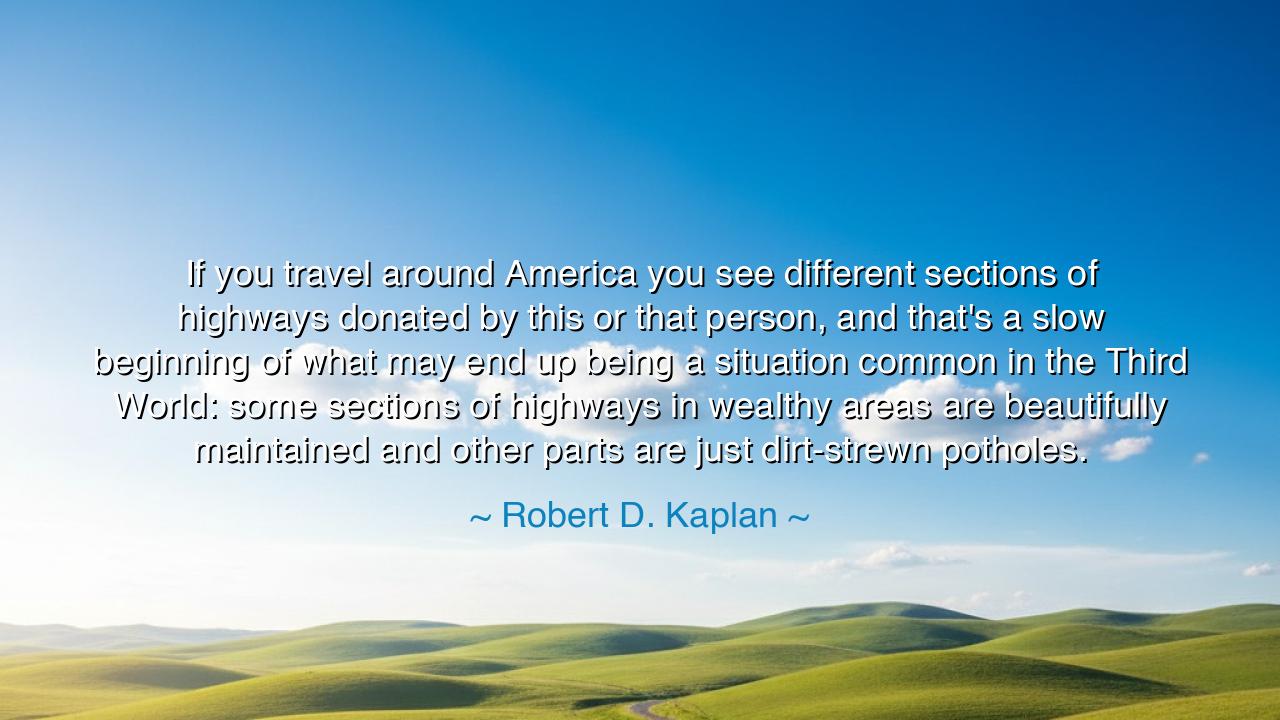
If you travel around America you see different sections of
If you travel around America you see different sections of highways donated by this or that person, and that's a slow beginning of what may end up being a situation common in the Third World: some sections of highways in wealthy areas are beautifully maintained and other parts are just dirt-strewn potholes.






Robert D. Kaplan, a chronicler of nations and the shifting tides of power, once observed with stark warning: “If you travel around America you see different sections of highways donated by this or that person, and that's a slow beginning of what may end up being a situation common in the Third World: some sections of highways in wealthy areas are beautifully maintained and other parts are just dirt-strewn potholes.” These words, plain yet piercing, uncover a truth that goes beyond asphalt and stone. They speak of inequality, of the dangerous divide that emerges when public goods are left to the whims of wealth, and when the common bond of society begins to unravel.
The origin of this saying lies in Kaplan’s long career as a journalist and thinker, where he studied the decline of states and the rise of instability across the world. Having traveled through Africa, the Middle East, and Eastern Europe, he witnessed firsthand how fragile nations often fracture—not always because of invasion, but because of neglect, corruption, and inequality. He recognized that when public services are parceled out unevenly, when wealth dictates which roads are smooth and which remain broken, the seeds of disunity and decline are sown. His warning was that even powerful nations, if careless, may drift toward the same fate.
This truth has been echoed throughout history. Consider the fall of the Roman Empire. Once, Rome’s roads bound its vast territories together, maintained by the might of the state. But as corruption spread and inequality deepened, roads in some regions decayed, while others closer to wealth and power remained passable. The great arteries of empire—once symbols of unity—became fractured, mirroring the empire’s political and social decay. Kaplan’s words about highways are but a modern echo of this ancient lesson: when the common good is abandoned, the path toward decline quickens.
The imagery of potholes and pristine highways is more than a metaphor; it is a symbol of justice and injustice. Where the wealthy travel in comfort while the poor stumble on broken roads, the unity of a people begins to rot. For roads are not simply passages of stone—they are lifelines of connection, commerce, and community. When they divide rather than unite, they reveal a society where privilege determines access, and where solidarity has been forgotten.
Kaplan’s warning also touches the heart of democracy. For democracy is not merely the right to vote, but the shared promise that all citizens are entitled to the same dignity in their daily lives—whether it be in education, in health, or in the simple act of driving a safe road. When this promise falters, when one group lives in abundance while another wallows in neglect, the peace of the republic trembles. The Third World conditions he invokes are not insults, but reminders of what happens when inequality hollows out the strength of nations.
The lesson is both stern and urgent: a nation that neglects the commons—its roads, its schools, its public spaces—sows the seeds of division and decline. The greatness of a society is measured not by how the wealthy live, but by how the ordinary citizen walks, works, and travels. If highways, the very veins of a nation, reveal stark inequality, then so too will every other institution, until the fabric of unity tears apart.
Practically, this means citizens and leaders alike must guard the common good as sacred. Investments in infrastructure, in fairness, in shared prosperity are not luxuries—they are the foundation of peace and stability. Each generation must resist the temptation to privatize what should belong to all, and must see in every pothole not just inconvenience, but a warning that inequality is taking root. To build a just nation is to build roads that serve all people equally, binding together the poor and the rich upon the same path.
Thus Kaplan’s words endure as a call to vigilance: roads reveal the soul of a society. If they divide, the people will divide. If they unite, the people will unite. Let us, then, not allow our highways—whether of stone, of commerce, or of justice—to crumble into symbols of inequality. Let us keep them strong, that they may carry not only our bodies, but our shared destiny forward. For in maintaining the common road, we maintain the common bond of civilization itself.






AAdministratorAdministrator
Welcome, honored guests. Please leave a comment, we will respond soon